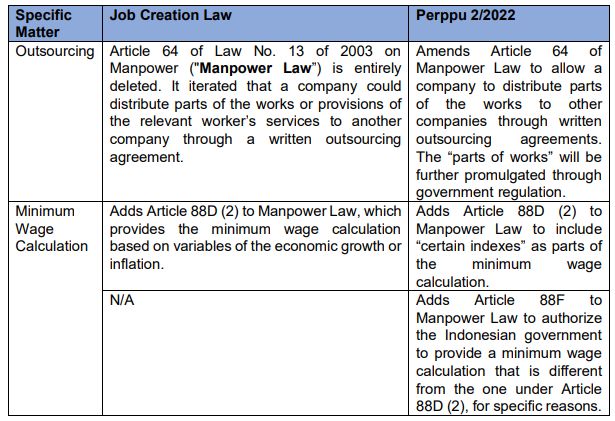- within Employment and HR, Tax, Government and Public Sector topic(s)
As mandated by Constitutional Court Decision No. 91/PUU-XVIII/2020 dated 25 November 2021 ("Constitutional Court Decision 91"), Indonesia has issued Government Regulation in Lieu of Law Number 2 of 2022 on Job Creation ("Perppu 2/2022") (see our previous article here).
In Constitutional Court Decision 91, the Judges have instructed the Government of Indonesia and the House of Representatives (Dewan Perwakilan Rakyat or DPR) to make the necessary improvements and/or revisions to Job Creation Law so that the content would conform to the provisions of the 1945 Constitution within no later than two years after the issuance of Constitutional Court Decision 91. To avoid the absence of laws and inadvertent reversion to the previous regulatory regime, Perppu 2/2022 was issued on 30 December 2022 as the "emergency" measure. As a reference, a Perppu or Government Regulation in Lieu of Law could be stipulated by the President of Indonesia in a precarious situation forcing the government to act quickly and precisely. Such action is still subject to the supervision of DPR as any Perppu must be passed by DPR.
In this article, we will address the material changes in Job Creation Law under Perppu 2/2022, specifically in the employment section.
Material Changes in Employment Law based on Perppu 2/2022

Transitional Provisions and Concluding Remarks
Based on our reading of Perppu 2/2022, the draft is similar to the previous Job Creation Law. It provides amendments on various previously enacted laws.
Please note that Perppu 2/2022 is effective starting 30 December 2022. The previous Job Creation Law is deemed revoked and declared invalid. However, all implementing regulations that have been amended by Perppu 2/2022 shall remain valid as long as the relevant regulations are not in contravention of Perppu 2/2022. Furthermore, any implementing regulations of the previous Job Creation Law shall remain valid, as long as it does not contravene Perppu 2/2022.
Given the changes in various sectors under Perppu 2/2022, the government will, most likely, issue new implementing regulations before the election season later this year.
The content of this article is intended to provide a general guide to the subject matter. Specialist advice should be sought about your specific circumstances.



